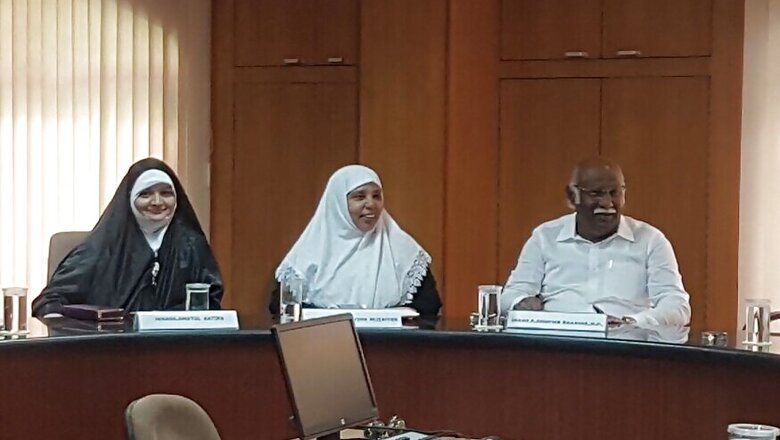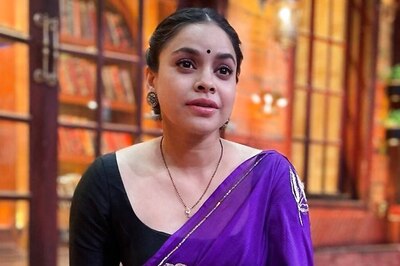
views
New Delhi: Curious eyes turn towards two burqa-clad women as they enter a male dominated auditorium. The sight was certainly rare at the waqf board meeting, making a member exclaim with happiness, “Do us proud!"
The first women ‘scholars’ of the board, Amatul Aatifa, 36, and Fathima Muzaffar, 45, from Tamil Nadu, were not only breaking stereotypes, but their appointment had become the much-discussed topic of the day among conservatives.
“How does Tamil Nadu ensure such diversity?" asks a pleasantly appalled elderly member of Orissa Waqf Board. To this, another member smilingly adds, “I wish you both surpass us in all the tasks you undertake as scholars."
The reactions were inevitable as the two were succeeding Sunni Chief Qazi Mohammed Salauddin Ayyub and Shia Chief Qazi Ghulam Mehdi Khan, unsettling the traditional order. The positions were earlier given to Qazis only.
Though, the state board had a woman chairman in 2002, Badar Sayeed, and women members in the following years, but for the first time women had occupied the post under scholar category.
The women scholars say that since their appointment on April 30, the move of the Tamil Nadu Waqf Board has drawn mixed response.
“A Qazi questioned my scholarship and used social media to discredit my work. But since I was a preacher on a television network, I received huge support from them and from the Shia Personal Law Board," says Aatifa.
Muzaffar, a Sunni scholar and member of All India Muslim Personal Law Board, says that she was “bullied" by conservatives and supporters of the Qazis.
“They told me that I should have some morals and decline the post," the Sunni scholar admits.
Pointing out that the battle for equality is same for women across communities, Muzaffar says, “It has always been difficult for women to overthrow orthodox order, whether it’s pope or a pujari. Our struggle was similar."
They say that Vaniyambadi MLA and Minister Waqf Board Dr Nilofer Kafeel played a pivotal role in the appointment. Sifting through many recommendations, she picked Aatifa and Muzaffar in the scholar category.
According to the rules, the Board is composed of a Chairperson; one and not more than two members, as the state government may think fit, to be elected from each of the electoral colleges. Muslim members of the state legislature, Muslim members of the Bar Council of the state and Mutawallis of the waqfs having an annual income of Rs 1 lakh and above.
One and not more than two members are to be nominated by the State Government representing eminent Muslim organizations; one and not more than two members to be nominated by the state government, each from recognized scholars in Islamic Theology; an officer of the state government not below the rank of deputy secretary.
The order passed by government and the Central Waqf Tribunal mentions that a minimum of two members should be women.
Recalling her struggle before acquiring the post, Muzaffar says that when she was nominated, a petition was filed questioning how a Qazi can be replaced by a woman.
“The Madras High Court made it clear that this development is happening with the assistance of the government provisions and the Central Waqf Tribunal. There is no individual vendetta, but it is part of government order," Muzaffar recalls.
Saying that she is not the kind to back out, the Sunni scholar narrates an incident of her days in Justice Ahmad Basheer College for Women when she was the union head and revived the cultural program after a hiatus of 20 years.
“The college management did not think it is apt for having extravaganzas for Women College but I started Charisma in 1991. It still continues," she says with a smile.
Muzaffar is the daughter of AKA Abdul Samad, a prominent Tamil Nadu politician, and an important leader of the Indian Union Muslim League.
Shia scholar Aatifa says that getting public acceptance was the greatest challenge. “No one bothered about the Waqf board but with our entry, the Waqf became the talk of the town," she adds.
Both the women went to the same college and are together in the same cabinet for the promotion of women empowerment, skill development with focus on women, optimum utilization of waqf properties for the development of the community at large.
“We will help the Shia community to utilize all available schemes of government, which were not exploited completely due to lack of informational flow," says Aatifa.
Muzzfar says that her priority would be to ease Waqf properties from encroachment. “If we are able to do that then Waqf will be able to contribute huge revenue to the government, she says, adding that she will also work for having schools and orphanages in every district.
Unhappy with the Triple Talaq Bill that introduces criminal punishment in civil matter, the Sunni scholar says that Waqf would look into providing support in such cases. Also have destitute homes.


















Comments
0 comment